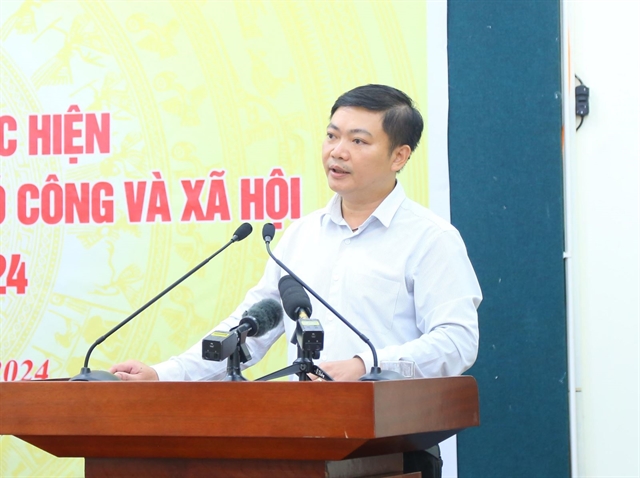 |
| Nguyễn Duy Cường, deputy head of Social Insurance Department under the Ministry of Labour, Invalids and Social Affairs. VNA/VNS Photo |
Nguyễn Duy Cường, deputy head of the Social Insurance Department under the Ministry of Labour, Invalids and Social Affairs, speaks to the Vietnam News Agency about the key changes in the revised Law on Social Insurance 2024.
Could you elaborate on the new changes in the revised law?
The amended Social Insurance Law, comprising 11 chapters and 141 articles, introduces significant revisions aimed at enhancing social security in line with the Constitution. These changes institutionalise reform guidelines outlined in Resolution 28 of the Việt Nam Communist Party Central Committee and related documents, addressing actual challenges while expanding rights and benefits to encourage greater participation in social insurance.
One of the major changes in the revised law is the introduction of social pension benefits, establishing a multi-layered social insurance system. This new benefit is funded by the State and builds on existing provisions for elderly individuals who do not receive pensions or monthly social insurance benefits. The eligibility age for social pension benefits has been lowered from 80 to 75 years. Additionally, individuals aged 70 to 75 from poor and near-poor households will also qualify for these benefits.
Another key revision strengthens the connection between social pension benefits and basic social insurance. The revised law introduces a monthly subsidy for employees who do not qualify for pensions and are not yet old enough to receive social pension benefits. Specifically, those who retire without meeting the 15-year contribution requirement can receive this monthly subsidy, with their health insurance costs covered by the State budget during this period. This change aims to provide more comprehensive support for workers who have contributed to the social insurance system but are not yet eligible for full pension benefits.
The revised law also expands the scope of compulsory social insurance to cover new groups. These include business owners of registered households, non-professional workers at the commune, village, and residential group levels, part-time workers, and unpaid business and cooperative managers. By including these groups, the law aims to extend social insurance coverage to a broader segment of the population, ensuring that more individuals can access the benefits and protections offered by the system.
 |
| CHECK UP: Thanks to health insurance, people in the mountainous district of Văn Chấn, Yên Bái Province, have access to modern medical examination and treatment services at the local medical centre. VNA/VNS Photo Việt Dũng. |
In addition to expanding coverage, the law enhances benefits for non-professional workers at the commune level. These workers will now be eligible for sick leave and maternity benefits, in addition to the retirement and death benefits they currently receive. This change recognises the valuable contributions of non-professional workers and seeks to provide them with a more comprehensive range of social insurance benefits.
Voluntary social insurance participants are also set to benefit from the revised law. Those who meet certain conditions will be entitled to a maternity allowance of VNĐ2 million per newborn child, funded by the State budget. Importantly, this allowance does not require participants to pay more than the current rate set by regulations, making it an accessible benefit for voluntary contributors.
To make pensions more accessible, the minimum required contribution period for pension eligibility has been reduced to 15 years from 20 years. This change allows more individuals to qualify for pension benefits, especially those who may have had interruptions in their careers or contributions.
The law also introduces measures to encourage employees to reserve their contributions rather than opting for a lump-sum payment. Employees who stop participating in social insurance can still request a lump-sum payment under specific conditions. However, those who choose to reserve their contributions instead of taking a lump sum will benefit from improved pension conditions, health insurance coverage, and monthly allowances. These incentives are designed to promote long-term participation in the social insurance system, ensuring that employees can maximise the benefits they receive upon retirement.
The law also takes steps to protect the rights of Vietnamese citizens working abroad and foreigners working in Việt Nam. It aligns the duration of social insurance participation with international treaties to which Việt Nam is a member, ensuring that these working people’s rights are safeguarded under the revised legal framework.
To further improve the management of social insurance funds, the revised law expands the portfolio and methods of investment. This change aims to enhance the efficiency of social insurance fund investments, ensuring that the funds are managed effectively and sustainably to support the long-term viability of the social insurance system.
Additionally, the revised law introduces a chapter on supplementary pension insurance. This new provision stipulates the subjects, principles, and policies related to supplementary pension insurance, providing employers and employees with more options to contribute and receive higher pensions. By offering these additional choices, the law aims to enhance the overall pension system, making it more flexible and responsive to the needs of participants.
One of the significant changes in the revised law is the replacement of the “base salary” with a “reference level”. The reference level is a government-prescribed monetary amount used to calculate social insurance premiums and benefits. It will be adjusted based on economic indicators such as the consumer price index and economic growth, as well as the capacity of the State budget and the social insurance fund. This change is intended to ensure that social insurance calculations remain fair and reflective of the economic context.
The law also includes provisions to strengthen legal compliance and protect the legitimate rights and interests of employees. A dedicated chapter has been added to regulate the management of social insurance collection and payment, including the handling of late payments and evasion. These measures are designed to enhance the enforcement of social insurance obligations, ensuring that employees receive the benefits they are entitled to.
In an effort to simplify procedures and improve accessibility, the revised law includes provisions for electronic transactions in social insurance. It also reduces and simplifies the required records and procedures for implementing social insurance. These changes aim to make it easier for participants to access social insurance benefits and for employers to comply with their obligations.
Finally, the law amends and supplements existing regulations to better align with current realities and ensure the rights of employees are more comprehensively protected. By inheriting and developing current regulations while amending those that are inappropriate, the law aims to ensure feasibility, consistency, and unity within the legal system.
The Labour Code has adjusted the retirement age for men and women to be closer — 62 for men and 60 for women. Why were there no changes in the new law to reduce the difference in pension rates between men and women?
No changes were made to the pension calculation formula due to considerations regarding the balance of the social insurance fund. The revised law inherits the formula from the 2014 law. However, the drafting committee did include provisions to calculate pension rates for male employees who have paid between 15 and 20 years of contributions, as this group was not previously covered.
Globally, the average pension rate per year of social insurance participation is about 1.7 per cent. In Việt Nam, this rate is 2.14 per cent for men and 2.5 per cent for women. Based on these ratios, it was proposed to set the rate at 2.25 per cent per year for men, with a 40 per cent pension level for 15 years of participation, which is an increase from the previous proposal.
When the amended social insurance law takes effect, will the implementation guidance be issued promptly?
Yes, the Government will promptly issue specific decrees to implement the new law, which takes effect on July 1, 2025.
In total, 11 decrees will be issued: seven by the Ministry of Labour, Invalids and Social Affairs, three by the Ministry of Finance, and one by the Ministry of National Defence. Additionally, three circulars detailing the law’s implementation will be issued by relevant ministries and sectors. VNS
- Reduce Hair Loss with PURA D’OR Gold Label Shampoo
- Castor Oil Has Made a “Huge” Difference With Hair and Brow Growth
- Excessive hair loss in men: Signs of illness that cannot be subjective
- Dịch Vụ SEO Website ở Los Angeles, CA: đưa trang web doanh nghiệp bạn lên top Google
- Nails Salon Sierra Madre
 VnExpress News The News Gateway of Vietnam
VnExpress News The News Gateway of Vietnam





